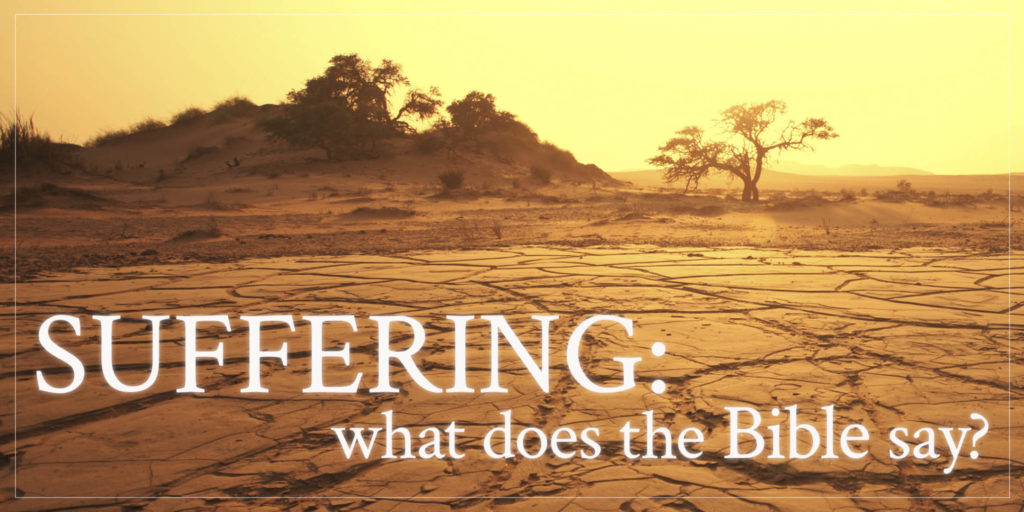It is common for us to think of suffering as a curse. Because we do so, we often think of suffering as the opposite of blessing. However, the Bible teaches us that suffering can function both as a curse and a blessing. While much has been written about suffering being a curse (or think of punishment due sin), I want to explain how suffering is a blessing. In order to demonstrate that suffering is a blessing, I want to explain Romans 5:3-5.

Romans 5:3-5
3 Not only that, but we rejoice in our sufferings, knowing that suffering produces endurance, 4 and endurance produces character, and character produces hope, 5 and hope does not put us to shame, because God’s love has been poured into our hearts through the Holy Spirit who has been given to us.
Romans 5:3-5
Romans 5 begins by stating that because we have been justified by faith, we have peace and grace from God and rejoice in the hope of the glory of God. Verse three begins with “not only that,” meaning not only do we rejoice in the hope of the glory of God, but because we have been justified by faith, we can also rejoice in our sufferings.
Rejoicing in sufferings doesn’t mean that we go around with a smile while we are enduring pain or tribulation. It doesn’t mean that we break one arm and say “thank God I didn’t break both arms”. We can do that. But rejoicing in suffering is more than an external measure. It’s an internal joy. Not a rejoicing at what is happening to us necessarily, but a rejoicing at what it will produce.
Suffering Produces Endurance
The first thing that suffering produces in endurance. How can suffering produce endurance? Perhaps the best illustration of this is physical exercise, especially running. It is the beginning of the new year and many will be setting resolutions about fitness and cardio health. They will begin to run. As they do so, they will discover that they can run only to a certain point before their body starts to hurt – their lungs burn, their legs feel like rubber – and their brain tells them they should stop. However, we know that many do not stop there. They persevere; they endure. They override what their body and brain are telling them and they keep running. When they do that, a crazy thing happens – they grown in endurance. Slowly, but surely, they can run a little longer than they used to be able to do so.
In the same way, when we go through tribulations and trials (isn’t it interesting that Paul doesn’t say “if”, but just assumes suffering will happen?) and instead of stopping or giving into bitterness and complaining, we look to Jesus as our joy and hope, our faith endures. It perseveres. It grows. And we can go just a little further than before. We don’t break. We don’t stop. We endure. But the only way to gain this sort of endurance is to go through the pain that would cause you to look to Jesus.
Endurance produces character
What is interesting to note here is that Paul uses the word dokimē, which means “proven character”. The key word is the word “proven”. This is in reference to steel or metal. As you probably know, when you are strengthening metal, you put it in fire. As it sits in the fire, the impurities come out. The metal worker then scrapes away the impurities and hardens the blade. The end result is a proven blade. A proven blade can be trusted because the impurities have been removed and what is left is strong metal.
When Paul speaks about producing character, he is not talking about an inherited character, but the character we become. Suffering serves as a refining fire. Through our endurance, we become stronger. We become pure and proven. Because the impurities of our lives were revealed and removed, we are stronger than before we entered the fire.
Endurance produces hope
As we read that, we may wonder how that can be the case? But I think the answer is as simple as reading the last part. We are stronger. We are proven. We have confidence that we really are children of God. In other words, one of the obstacles that we face as Christians is wondering if we are really living up to what we say we believe. We wonder if we are hypocrites. Suffering produces endurance, which produces character – it reveals to us the genuine nature of our faith. So, we grow in hope. It gives us hope that we really will inherit the promises. It gives us hope that we really do want the glory of God.
But also, we realize that God has been there with us. He never left us. In fact, he got us through the suffering. So our hope in him grows. We know we can trust Him.
When I was a kid, I knew that God was our provider, but I never experienced God as our provider. Then my dad went through a period when he did not have a steady job. Life was hard. There was a time when my family and I could not live together for a season. And, even after we were able to live together again, we were struggling financially. I remember once seeing my mom crying on the couch because of our inability to pay the bills. But when we got the mail that day, a check from the insurance company came. My mom had been in a car wreck years earlier and they were just discovering that she had not received the full payment. The amount allowed us to pay our bills! It came at just the right time. God had provided!
I knew about God providing in theory, but that taught me about him being our provider in reality! My hope in Him grew because I saw him keep his promises. But it was only in going through the trial that I was able to see that truth revealed. He teaches us hope.
And that hope doesn’t disappoint. It’s a hope that teaches us we can trust him, that we are saved, and that he does deserve glory.
But to see this, we had to suffer. We had to go through the fire. Not to be punished but to be blessed. Because suffering produced endurance, endurances produced character, and character produced hope. There’s not a plan B. There’s not an option of getting the endurance, character, and hope without the suffering. The suffering is necessary.
And, because of what it produces, the suffering is a blessing.


